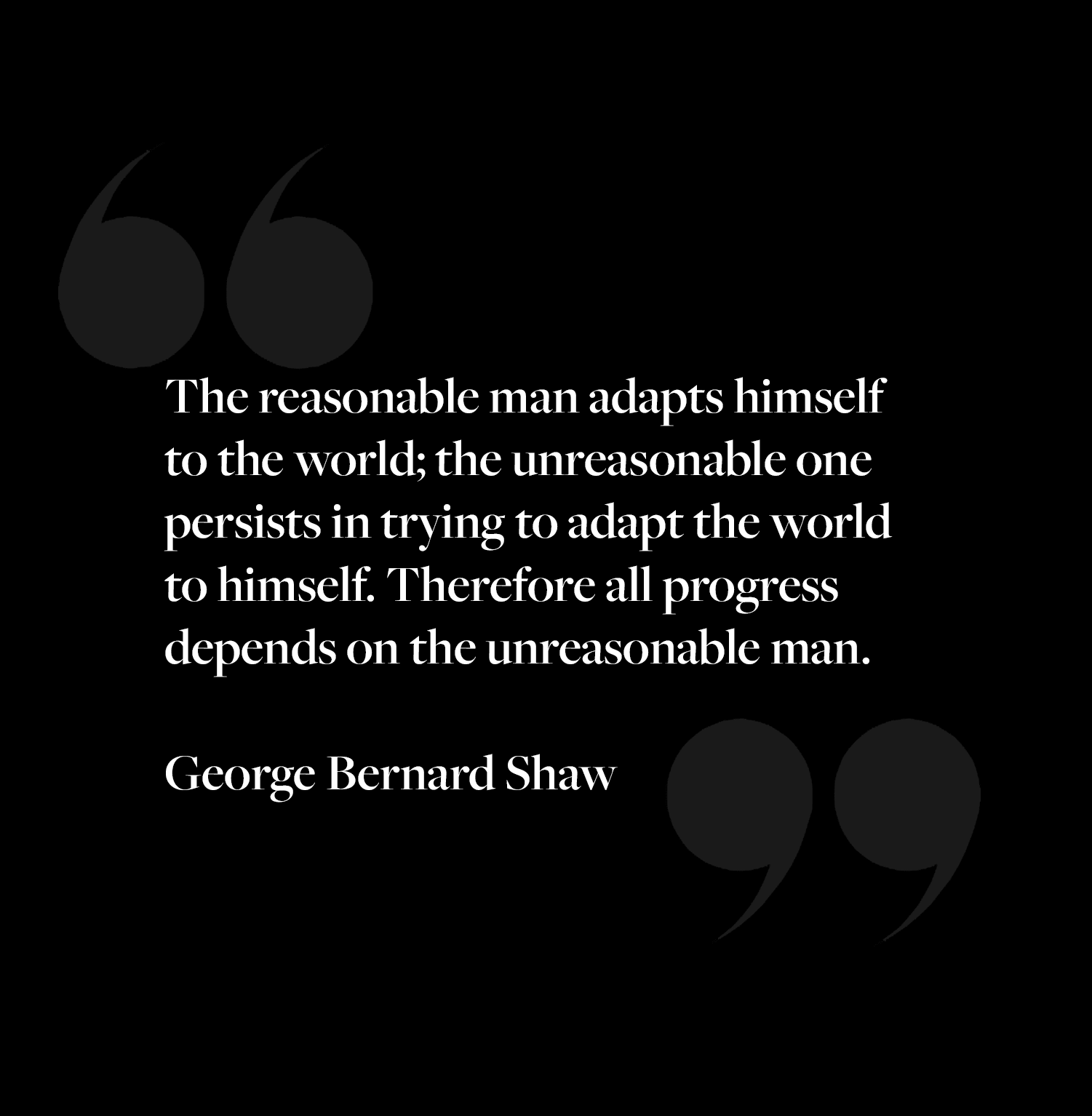




I love when I’m reading a (usually non-fiction) book and I want to highlight basically every single word. You know that feeling? It’s SO good and you have SO many aha moments that you can’t stop thinking about it. Because you can relate to it SO MUCH. And you actually feel like the author GETS you, so you want to keep reading and learning as much as you can.
I love to learn – MORE than ANYTHING in the world. And Today I want to share what I’ve learned (and have been thinking about) since reading Tim Ferris’ Four Hour Work Week.
It’s not a new book. In fact, it’s been out since like 2007 I believe; it’s just taken me forever to finally commit to reading it. I held off for a long time (despite its rapid popularity) because the title annoyed me. And plus, I tend to be resistant to things that EVERYONE is raving about.
Before you roll your eyes and think this may not apply to you because “I don’t want to only work 4 hours, that’s impossible” or “I don’t work” or “I like my job” or “I don’t work for myself” – let me stop you right there.
This book could have a positive effect on anyone who reads it. It’s interesting, challenging, and enlightening. Job, no job, in love with your job or hating your job, there is so much more than…”work talk” and something for everyone. Essentially, it’s a book on time management, getting to know yourself, questioning cultural status quo or what we’ve been taught, and bottom line, making life better slash easier. And isn’t that something we can all relate to wanting? Yup.
Before I jump into this post – where I’ll be sharing his best insights and how to apply them to any life – I want to make a few things clear. Essentially, Ferris wrote this book to help explain how he was able to get down to a 4-hour work week. He wanted to travel the world, go on adventure after adventure, live in foreign countries and that whole thing.
And that’s not me. I don’t want to only work 4 hours a week (I love working); I don’t necessarily want to travel the world either – or that’s not my main mission. A LOT of this book didn’t apply to me. But then again, there was enough that did. So as you read through this post, or the book, remember that you can take Tim’s advice and apply it to YOUR unique life.
Okay, enough talk. Let’s get into it.

Pareto’s Law or the 80/20 Principle
I’ve heard about the whole 80/20 thing before. But Tim brought up some pretty amazing points that challenged me to think in ways I haven’t before. He talks about an economist, Pareto, who studied income distribution and developed a “law” that changed Tim’s life. Pareto’s law essentially showed that 80% of the wealth and income in the world (way back in the day), was produced and possessed by 20% of the population. He also found that this could be applied outside of economics, specifically with his Garden. He found that 80% of his garden peas were produced by 20% of the pea pods planted.
To put it simply, Pareto’s Law illustrates that 80% of outputs result from 20% of the input. More examples or ways to think about it are: 80% of the results come from 20% of the effort and time; 80% of the profits come from 20% of the products and customers. Pretty crazy to think about, right? I find this absolutely fascinating.
Tim goes on to explain that he’d been slaving away 15-hour days, and for most of the day, was spinning his wheels without the results you think you’d get from 15 hours in the office! And this hit home for me, because it’s often how I feel.
Tim later goes on to experiment with Pareto’s law and asked himself the following questions:
- Which 20% of sources are causing 80% of my problems and unhappiness?
- Which 20% of sources are resulting in 80% of my desired outcomes and happiness?
The goal in answering these questions is to “find [our] inefficiencies in order to eliminate them and to find [our] strengths so [we] can multiply them.”
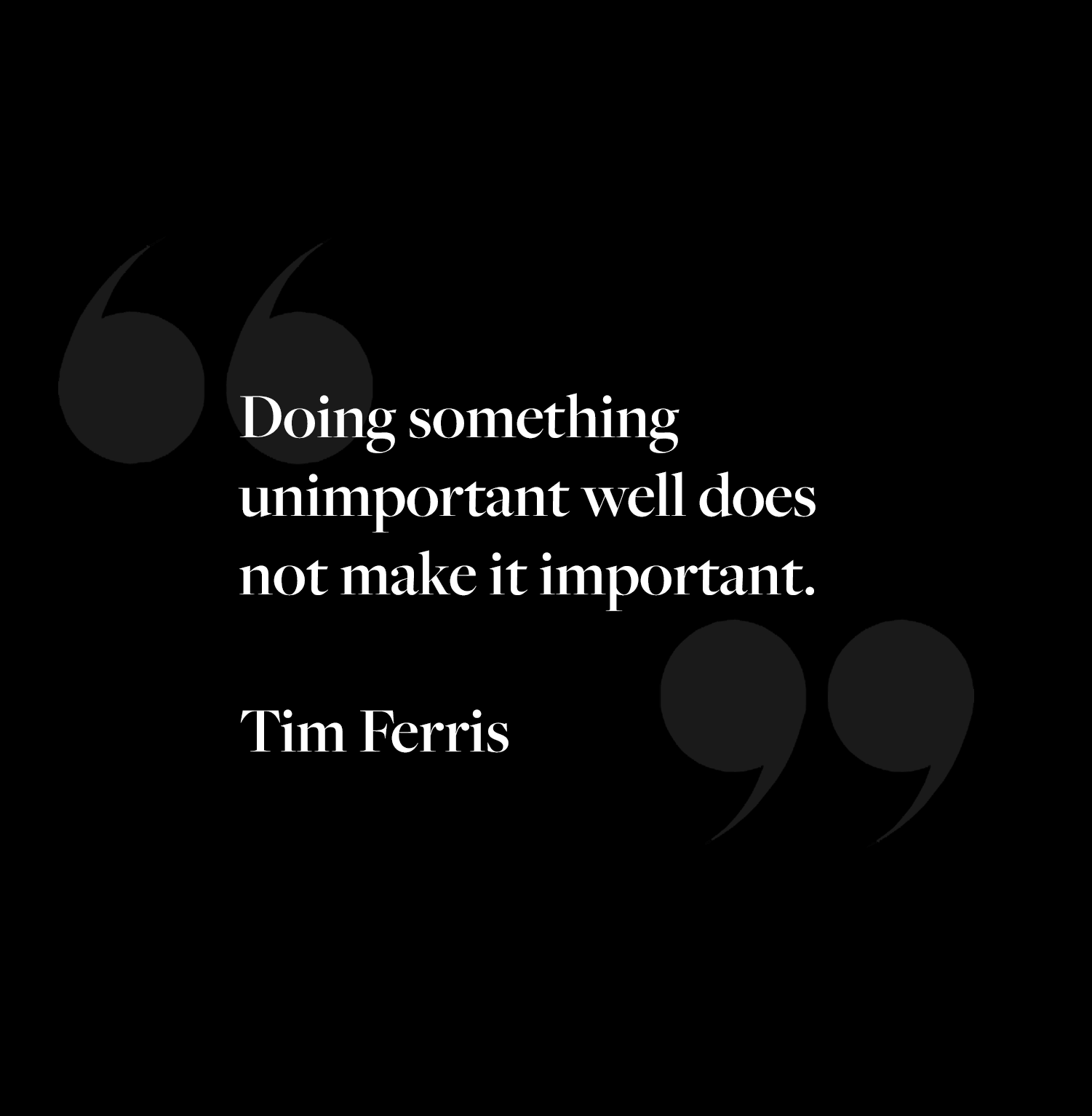
I love what Tim says regarding being effective vs. being efficient.
Rather than paraphrasing, I’ll just take the direct quote from the book: “Effectiveness is doing the things that get you closer to your goals. Efficiency is performing a given task (whether important or not) in the most economical manner possible. Being efficient without regard to effectiveness is the default mode of the universe.” Just because you do something unimportant well does not make it important or worth your time. And further, just because it took A LOT of time to do something (or lots of effort) also does not mean it’s important!
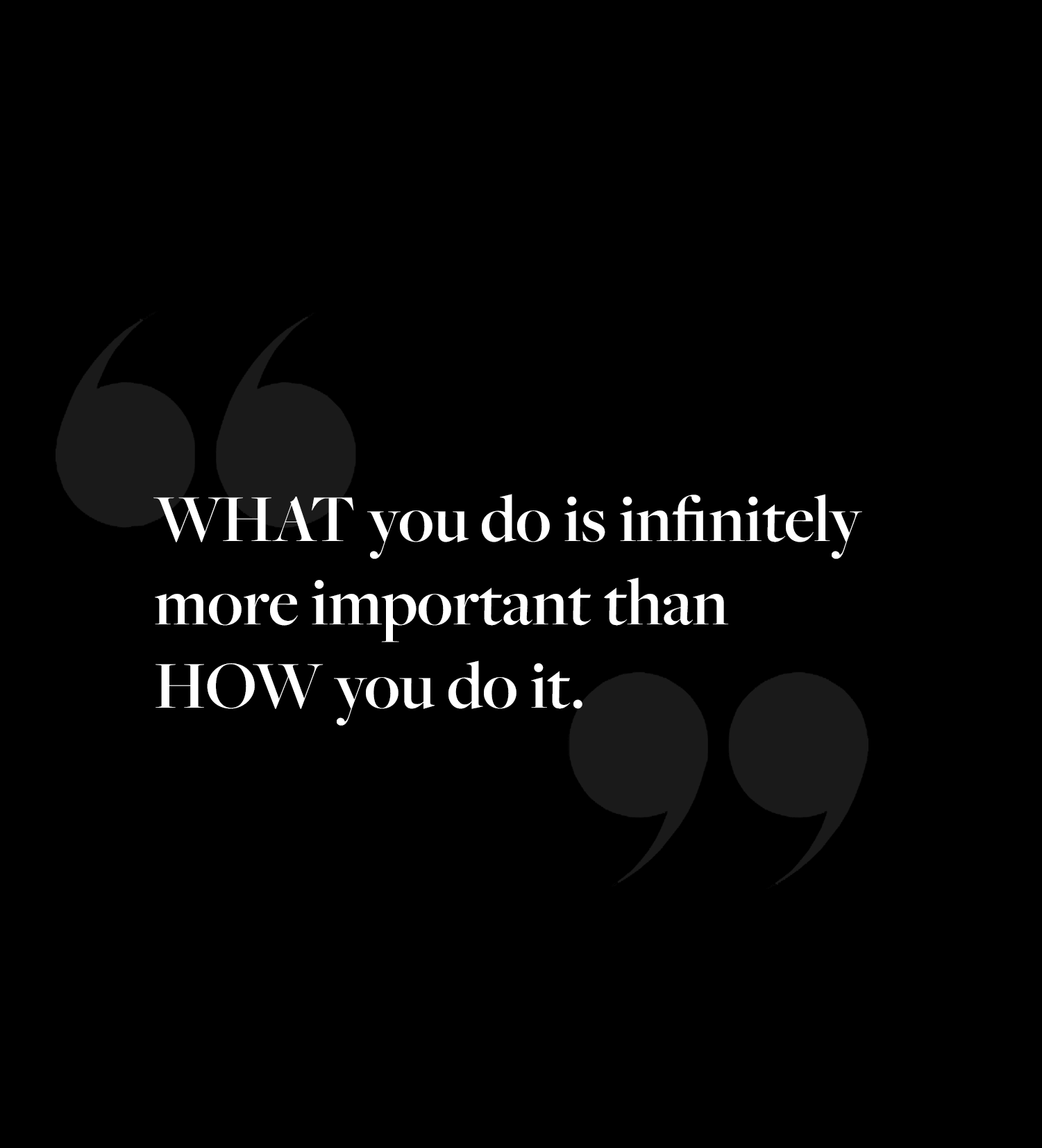
How to Use This in Real Life:
I started thinking about all the things in life that I get stuck on. Or the things/tasks/stuff I’m not good at. And it’s funny how the things I’m not GREAT at are usually the ones that take up SO much of my time. I’m naturally inefficient in certain areas, as we all are. And further, these areas are harder for me and take more time and brain power.
I was challenged to consider the parts of my business that I excel at – the tasks I’m able to knock out with pleasure because I enjoy it. And most of the time, the things we enjoy are those that come easier to us; the things we’re good at. Right?
The idea of this whole 80/20 rule is to think outside the box when it comes to making the most of your strengths and weaknesses – in ANY area of life. It’s helpful to think about not only business-related areas, but also personal (people!) too.
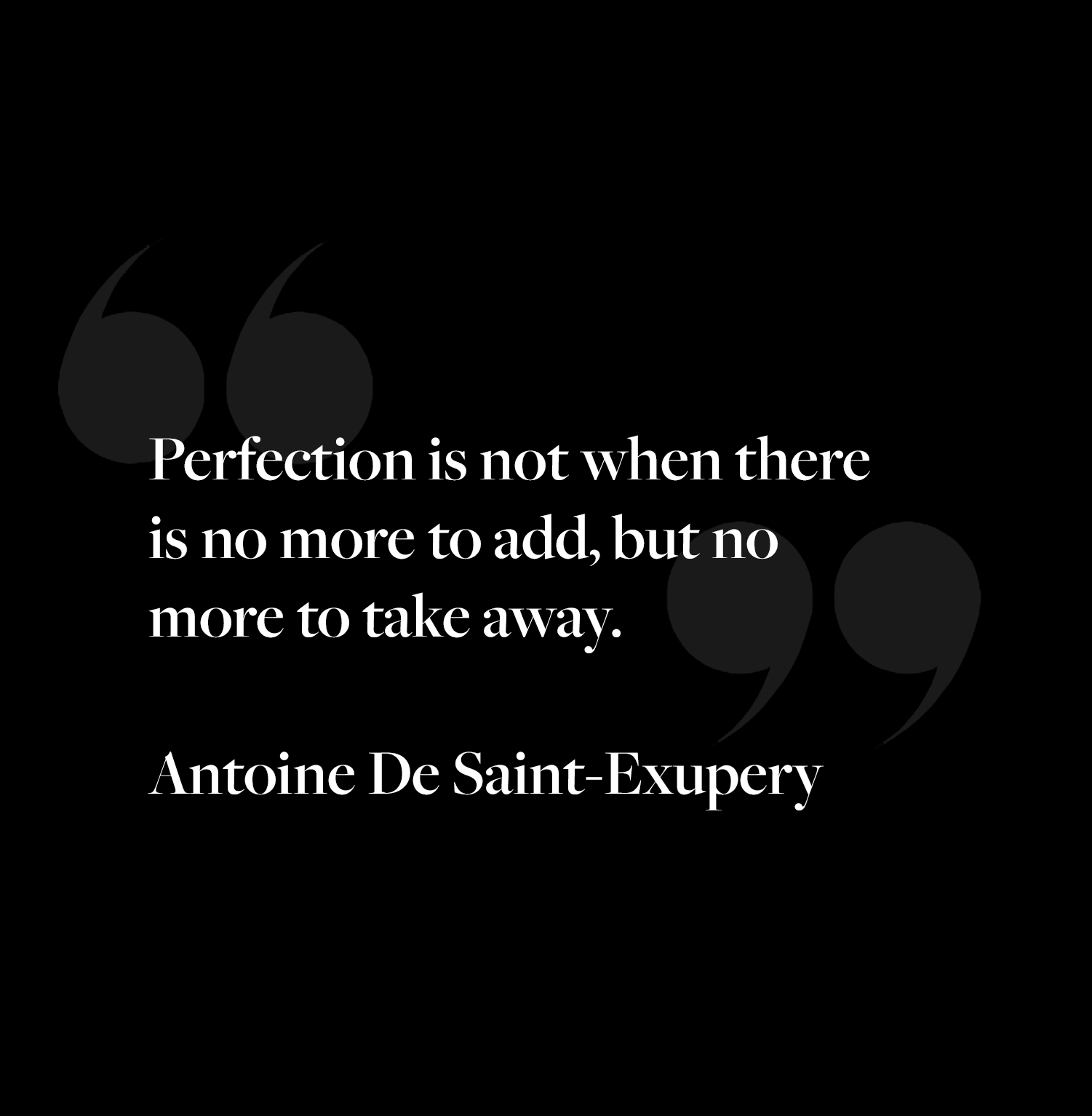
Ahh, the ole more is NOT more principle. Being busy is not the answer; doing more does not always translate into being better.
Business wise, Tim suggests to delegate, or heck, even get RID of the inefficiencies in your life. Question if you’re doing things because you actually need to, or because you think you need to. And then, think of ways to increase your efficient flow and strengths. Put simply, focus on your improving your strengths rather than trying to FIX or BETTER your weaknesses.
When it comes to profits of my own business, and for any business owners, do you have a small loyal community (20%) who make up for 80% of your profit? Yet you’re spinning your wheels trying to sell to 100% of your community?
Am I making 80% of my profit off of certain parts of my business, yet I’m trying to expand into other areas that don’t do well for me because they do well for someone else? I was! And Pareto’s Law made me realize that was pretty stupid. I’ve definitely adjusted since. And maybe I’ll do a full blog post on how this book has helped my business – would y’all be into that? Didn’t want to bore anyone.
Bottom line, take a hard look at your life and your job – or even your friends! – and find what your 80s are (both positive and negative). Then your 20s (again, positive and negative). See what it does for you – or what changes come from it. And as Tim says, “when in doubt or overwhelmed, take a break and 80/20 both business and personal activities and relationships.”
Related: How To Overcome The Pressure To Be Perfect
The Low-Information Diet
Tim talks a lot about consuming less. And I freaking love this. Personally, it reminds me of a few biblical principles (not worth getting into here), BUT I just love that he touched on it. Basically, he encourages readers to ‘cultivate selective ignorance.’
The things we PUT in our minds and spend our time on matter and have a direct impact on what we’re able to accomplish.
Think about all the STUFF you consume in a day. Between scrolling your Instagram feed, listening to people you don’t really care about, even watching the news and reading the newspaper, we take in A LOT. And Tim argues that most of the information we consume is either “time-consuming, negative, irrelevant to your goals, [or] outside of your influence.” Further, if we are going to DO more with LESS, then we must be better gate-keepers of our brain space. Limit what you consume so that you’re able to focus on the things that really matter.
He argues that this one change alone will free up a ton of time and brain space – both of which can be used for more productive, valuable things that increase your life value.
How to Use This in Real Life:
Now, I don’t know about cutting myself off from the outside world in general, but I do like his approach of limiting this and getting it in small doses 1-2x per week – instead of off and on all day long. He also has an entire chapter on eliminating distractions and interruptions, which pertains to the low-info diet. I won’t go into great detail, but instead, here are some of the tips I took away:
- Turn off notifications
- Check email twice per day; never first thing in the morning (that’s when you should be getting the most important, crucial task of your day done instead).
- Create auto email responses and canned responses (and talk to your boss if you’re worried how this will effect anything).
- Train those who you communicate with to have concise responses – which I am horrible at. As women, I think most of us add a lot of fluff to be nice – even when we’re simply trying to get or give one answer. So I’m working on conciseness with communication.
- Define end times of calls and meetings and set an agenda.
- The cubicle is your temple – don’t allow visitors when you don’t want them. Train people. Use headphones to show your point.
- Batch tasks – SO IMPORTANT!
- Opt out of emails, call lists, etc. as soon as something you don’t need arrives.
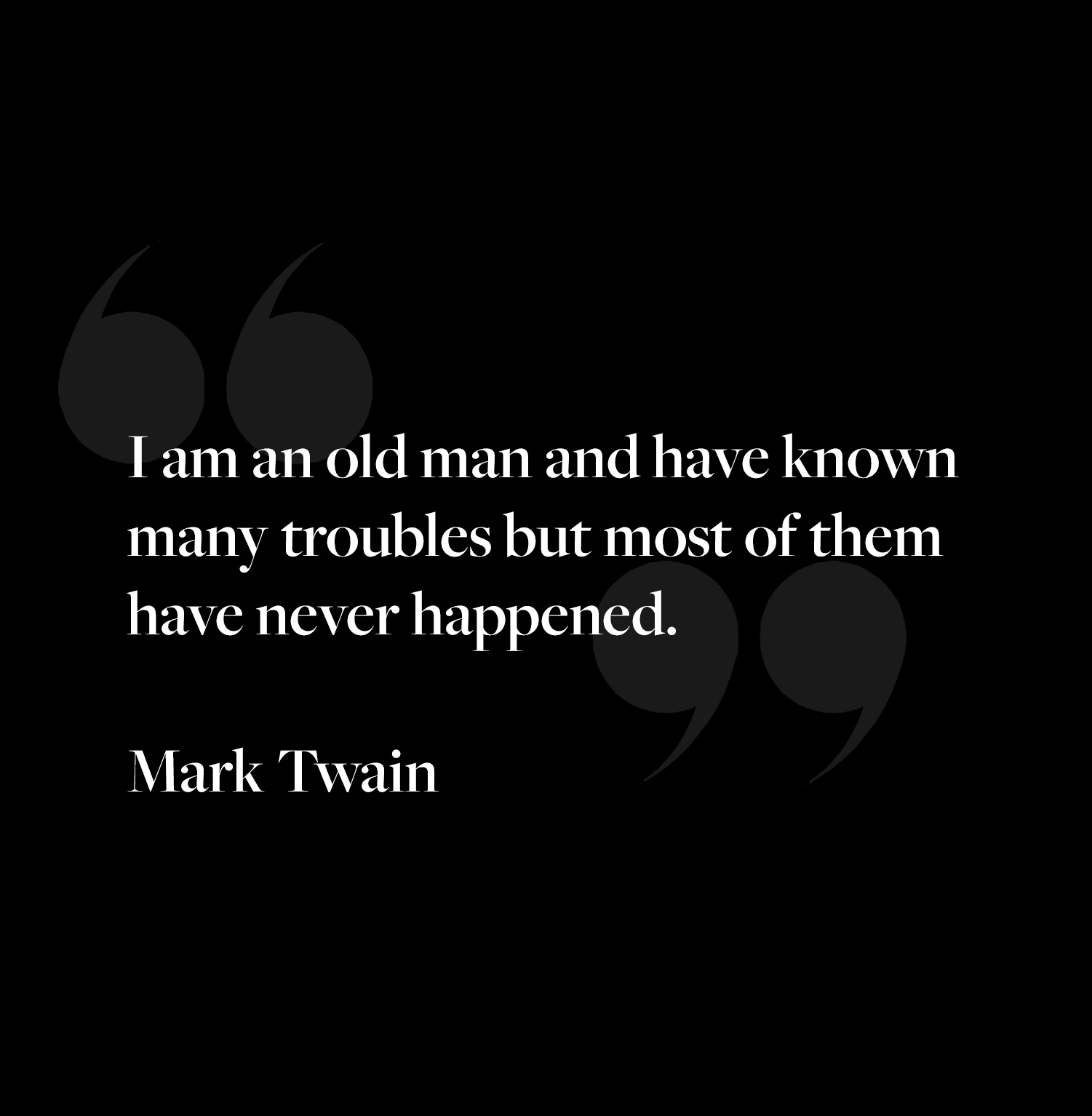
Fear and Uncertainty
Lately, I’ve been thinking A LOT about fear and the role that it plays in my life and business.
Fear can easily dress itself up as something else and talk you out of just about anything. For me, fear of failure is HUGE. But not just fear of failure, I also hate uncertainty and risk. Heck, this has a lot to do with my original career path – to be a CPA. I chose it because I knew what my future would look like with this path. More on this in a later blog post maybe.
I fear not knowing what will happen or having to live with certain decisions I make. I fear messing up or not being good enough.
What are you putting off out of fear? Usually what we most fear doing is what we most need to do. it is fear of unknown outcomes that prevents us from doing what we need to do. What is it costing you to postpone action?
“If you are insecure, guess what? The rest of the world is, too. Do not overestimate the competition and underestimate yourself. You are better than you think.”

Tim talks a lot about fear. And it really resonated with me. A lot of the time, it’s fear that holds us back from something. Well, fear AND uncertainty. It’s fear of failing, fear of judgement, fear of NEW, fear of pain, fear of growth, fear of ourselves.
Further, it’s like we’d all rather be unhappy (by staying put, not pursuing something/making changes) than being uncertain of what those changes may bring. Think of it this way: staying in a job or a relationship because you’re scared you won’t meet anyone better or like any other job better/make as much money. This is fear; and this is why we are willing to endure discomfort or misery at the risk of being uncertain.
How to Use This in Real Life:
Tim suggests doing something every single day that scares you, and I gotta say, I love it. Maybe that’s something like posting an Instagram because you freaking like the photo even though you know it won’t perform well. WHO CARES?! YOU LIKE IT! Or reaching out to a friend of a friend about a job. Or heck, quitting your job to pursue another. What’s the worst that can happen? You don’t get a lot of likes, they don’t respond, you pick up a side job to pay the rent while building your passion project?! When you think worst case, often it’s not that bad or life-changing, yet we let these fears run our mind. And we’re all exhausted from it, aren’t we?
If anything, this book really made me think about my own fears more often – and how I let a lot of them run my life without truly realizing it. Now, when I push back on something internally, it’s a good practice to note where the fear is coming from and find a way to push through it.

Top 13 Mistakes to Avoid
Tim has a phrase that he talks about throughout the book – “new rich” which basically talks about this new wave of people fighting the impulse of the old world and society norms, earning money, working less, throwing away the traditional form of retirements, outsourcing – etc., (aka what he’s done). And while I don’t want to harp on that too much because it’s SO much information – and not all of it was relevant to me, I do love this list at the end of the book. It’s the list of the 13 mistakes people can make when designing their life.
I do think we can all take something from these slip-ups, even by reading the list in a bullet form like so (keep in mind these are MISTAKES to avoid):
- Losing sight of dreams and falling into the work for work’s sake.
- Micromanaging and emailing to fill time.
- Handing problems your outsourcers or coworkers can handle.
- Helping outsourcers or coworkers with the same problem more than once, or with non-crisis problems.
- Chasing customers when you have sufficient cash flow to finance your non-financial pursuits.
- Answering email that will not result in a sale or that can be answered by a FAQ or auto-responder.
- Working where you live, sleep, or should relax.
- Not performing a thorough 80/20 analysis every two to four weeks for your business and personal life.
- Striving for endless perfection rather than great or simply good enough, whether in your personal or professional life.
- Blowing minutiae and small problems out of proportion as an excuse to work.
- Making non-time-sensitive issues urgent in order to justify work.
- Viewing one product, job, or project as the end-all and be-all of your existence.
- Ignoring the social rewards of lie – surround yourself with smiling, positive people who have nothing to do with work.
*
OK, I could honestly go on and on about the lessons I learned in this book, but I’m going to stop there. If this type of post excites you, do yourself a favor and read the whole book – or listen to it on audio. I haven’t stopped thinking about it. Either way, I hope that y’all took something from the lessons above.
Let me know if you’d be interested in hearing more of my business changes since reading the book, because that’s a whole other post…or two.
Do I have any Tim Ferris fans out there? I know he has a podcasts too that I’m planning on listening to ASAP
Outfit Details:

